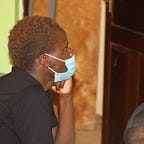KASA at Kenya Space Expo & Conference
Kibera Aeronautics and Space Academy (KASA) attended the inaugural Kenya Space Expo and Conference event that took place at Sarit Expo Centre from 15th June to 17th June. The theme of the event was “leveraging space capabilities for national development”. The thematic areas of the conference were:
- Earth Observation
- Space Engineering
- Space Economy
- Astronomy and Space Science
- Education and Outreach
Melkizedek Owuor and Renice Owino represented KASA at the three-day event.
The Kenya Space Agency-organized event brought together key space sector industry players and stakeholders to showcase and demonstrate their innovations. Among the organization that attended include AfriCultuReS, Digital Earth Kenya, AAC Clyde Space, ESRI Eastern Africa, and Regional Center for Mapping of Resources for Development. Academic institutions that were present included Jomo Kenyatta University of Agriculture and Technology, University of Nairobi, Taita Taveta University, Technical University of Kenya, and Amateur Astronomical Society of Kenya, among others.
KASA was among the institutions that represented the fifth pillar of the event (education and outreach), specifically the private educational sector. The private sector has a market share of 3% of Africa’s space industry.
The KASA fraternity is grateful to the Kenya Space Agency for sponsoring our booth at the expo. The booth gave us great exposure and the opportunity to network and share our mission and vision with industry-relevant people. We met parents who liked what we do. We met kids who showed interest in attending our bootcamp programs. We met college students who liked our program and showed interest in joining our team as volunteers — as course developers, coaches, and trainers. We met key industry leaders in the Geo-STEM sector; such as Young Scientists Kenya, The Travelling Telescope, Tech Kidz Africa, and the Young Aviators Club of Africa.
Furthermore, we are grateful to Kenya Space Agency, through their Space Club program, for providing us with their recently published children’s books. We received five copies of each of the four categories of the books.
The four categories are:
- ICT and Robotics
- Space Systems Engineering
- Earth Observation
- Space Science & Astronomy
We are looking forward to engaging our learners with the books in our upcoming bootcamp training programs.
Among the many things that Melkizedek and Renice learnt from the event include:
- Identification and mapping of the Geo-STEM players in the industry to avoid duplication and wastage of resources. This might be brought about by formation of a countrywide association with all the relevant players in the industry as members. This presents an opportunity for each player to learn what other players are doing and their respective unique value propositions. This will eventually reduce the possibility of two or more organizations in a single region or neighboring regions providing a similar solution, and bring about diversification in the industry.
- Collaboration among industry players (and public-private partnerships) for adequate innovation and execution of projects. Existing Geo-STEM organizations need to strategically partner with each other on relevant projects. This way, each partnering organization focuses on their strengths to projects at hand, hence, increasing probabilities of success and innovation. This is in line with our ongoing partnership with Amateur Astronomical Society of Kenya, Leo Sky Africa, and Mars Society Kenya to develop digital educational content on Astronomy (under our micro-course Staring into Space) that we will deliver to local high schools around the country.
- Emphasis on science, technology, and innovation as the backbone of the country. Geo-STEM industry players to lobby the public and create awareness about the importance of STEM. This stretches to cover the exposure of learners to STEM-related careers and importance of those careers.
- Support from relevant government bodies. This involve establishment of government programs to support STEM education at different capacities; for example, by supplying STEM equipment and other resources — such as rocket models, Arduino boards, LEGO Mindstorms, and books — and grants to private STEM programs and universities for science research advancements.
… Africa must change the narrative that the sky is the limit and explore possibilities of rising beyond the skies to tap into the untapped potential of the new frontier of Space economy.
Defense Cabinet Secretary Hon. Eugene Wamalwa closed the event. One of his last remarks at the event included “… Africa must change the narrative that the sky is the limit and explore possibilities of rising beyond the skies to tap into the untapped potential of the new frontier of Space economy.”
